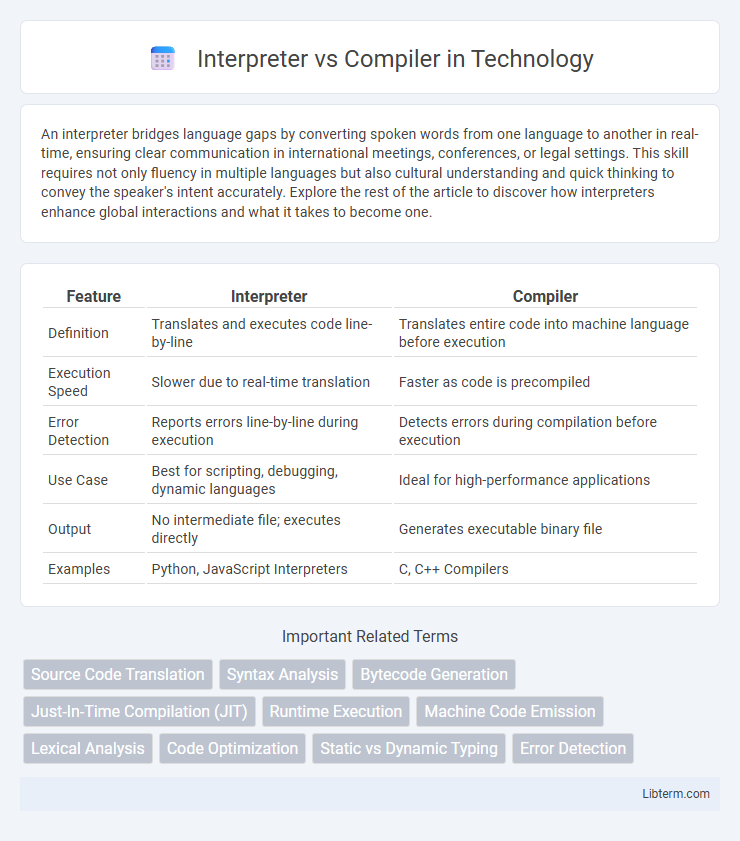An interpreter bridges language gaps by converting spoken words from one language to another in real-time, ensuring clear communication in international meetings, conferences, or legal settings. This skill requires not only fluency in multiple languages but also cultural understanding and quick thinking to convey the speaker's intent accurately. Explore the rest of the article to discover how interpreters enhance global interactions and what it takes to become one.
Table of Comparison
| Feature | Interpreter | Compiler |
|---|---|---|
| Definition | Translates and executes code line-by-line | Translates entire code into machine language before execution |
| Execution Speed | Slower due to real-time translation | Faster as code is precompiled |
| Error Detection | Reports errors line-by-line during execution | Detects errors during compilation before execution |
| Use Case | Best for scripting, debugging, dynamic languages | Ideal for high-performance applications |
| Output | No intermediate file; executes directly | Generates executable binary file |
| Examples | Python, JavaScript Interpreters | C, C++ Compilers |
Introduction to Interpreters and Compilers
Interpreters execute code line-by-line, translating high-level instructions into machine code during runtime, enabling immediate error detection and flexibility. Compilers perform a full translation of source code into executable machine code before execution, optimizing performance by producing standalone binaries. Both tools are essential in software development, with interpreters favoring dynamic debugging and compilers enhancing execution speed.
Definition of Interpreter
An interpreter is a software tool that translates and executes code line-by-line, allowing immediate program execution without producing a separate executable file. Unlike compilers, interpreters analyze and run source code directly, facilitating easier debugging and dynamic execution. Common examples of interpreted languages include Python, JavaScript, and Ruby, which rely on interpreters for real-time code execution.
Definition of Compiler
A compiler is a software program that translates high-level programming code into machine code, creating an executable file that a computer's processor can run directly. Unlike an interpreter, which translates code line-by-line during execution, a compiler performs the entire translation process before execution, enhancing runtime efficiency. Key examples of compilers include GCC for C/C++ and javac for Java.
Core Differences Between Interpreter and Compiler
An interpreter executes code line-by-line, translating high-level instructions into machine code at runtime, enabling immediate error detection but slower execution. A compiler translates the entire source code into machine code before execution, resulting in faster performance and optimized output but delayed error identification. Interpreters offer flexibility for debugging and dynamic execution, while compilers enhance runtime efficiency through precompiled code.
Advantages of Using Interpreters
Interpreters offer the advantage of immediate code execution, enabling rapid testing and debugging by translating high-level instructions line-by-line without the need for a separate compilation phase. This dynamic execution facilitates easy code modification and platform independence since the source code runs directly on the interpreter. Interpreters also provide better error localization, allowing developers to identify and fix errors precisely at runtime, which enhances development efficiency for scripting and interactive languages like Python and JavaScript.
Benefits of Using Compilers
Compilers translate the entire source code into machine code before execution, resulting in faster runtime performance and optimized memory usage compared to interpreters. They enable early detection of syntax and semantic errors, improving code reliability and reducing debugging time. The compiled executable files are platform-independent, allowing for easier distribution and deployment across different systems.
Performance Comparison: Interpreter vs Compiler
Compilers translate entire source code into machine code before execution, resulting in faster runtime performance due to direct execution by the CPU. Interpreters translate and execute code line-by-line, leading to slower performance because of continuous parsing and execution overhead during runtime. Performance differences also depend on language complexity and optimization techniques used by compilers.
Use Cases and Application Areas
Interpreters are ideal for languages that require rapid development and testing, such as scripting languages like Python and JavaScript, commonly used in web development, automation, and prototyping. Compilers excel in performance-critical applications like system software, game development, and embedded systems by translating entire source code into optimized machine code before execution. Use cases for compilers often involve C, C++, and Rust, while interpreters support dynamic and interactive environments with languages like Ruby and PHP.
Popular Languages Using Interpreters and Compilers
Popular languages using interpreters include Python, JavaScript, and Ruby, favored for their ease of debugging and dynamic execution capabilities. Compiled languages like C, C++, and Rust offer optimized performance and are commonly used in system-level programming and applications demanding high efficiency. Some languages, such as Java and Kotlin, utilize a hybrid approach with compilers generating intermediate bytecode that is executed by an interpreter or virtual machine, balancing portability and speed.
Choosing Between Interpreter and Compiler
Choosing between an interpreter and a compiler depends on the specific needs of the software development process. Interpreters offer immediate code execution and easier debugging, making them ideal for scripting and dynamic programming languages like Python. Compilers produce optimized, executable machine code, which enhances performance and is preferred for large-scale applications where execution speed and efficiency are critical.
Interpreter Infographic

 libterm.com
libterm.com